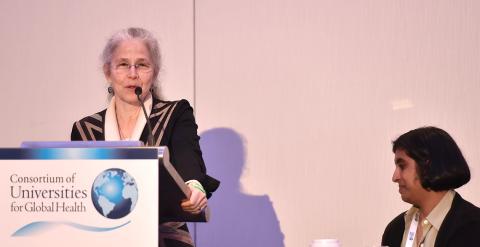Global Benefit
Fogarty Cheered by Supporters at CUGH Meeting

Photo: Roger Glass
Applause met the Fogarty International Center as it kicked off the recent Consortium of Universities for Global Health annual meeting held in Washington, D.C. In opening remarks, CUGH board chair Dr. Pierre Buekens of Tulane University told the 1,700 attendees that Fogarty has been an important champion for global health around the world.
NIH leaders discussed their research priorities during a plenary session moderated by FIC director Dr. Roger Glass. Dr. Anthony Fauci recalled that early in his tenure as NIAID director, he appreciated the global nature of infectious diseases and set out to organize his institute accordingly.
“Global health is integral to really everything we do at NIAID,” he said. Underpinning the success of the research he funds in low- and middle-income countries (LMICs) is the local scientific expertise cultivated by Fogarty. “If you look at the public health leaders in the developing nations throughout the world,” he said, “it’s stunning how many were Fogarty trainees at one time in their career.”
The global health agenda has expanded to include mental health, which poses a large and growing burden, said Dr. Pamela Collins, who directs NIMH’s global mental health portfolio. “What we learn in varied contexts and populations can also benefit us at home.”

Photo: CUGH
NCI acting director Dr. Doug Lowy echoed the sentiment. An NCI trial of the HPV vaccine conducted in Costa Rica indicates that a single dose is sufficient to ward off cancer, which will result in huge savings globally, as well as in the U.S., where three doses had previously been recommended.
Having grown up with a global perspective, NHLBI director Dr. Gary Gibbons said he is looking to see where his institute can be the most catalytic. He believes there are numerous research opportunities in LMICs, including studying the impact of the growing popularity of a western diet on heart disease, environmental exposures that affect lung development in children, sickle cell disease and others.
Another conference session showcased the Fogarty Fellows and Scholars program, which provides early-career scientists with a year-long mentored research experience in a low-resource setting where there are active NIH-funded projects.

Photo: CUGH
Dr. Hod Tamir of ICAP-Columbia University spent his Fogarty fellowship studying the benefits of social networks to women living with HIV in India. “It can’t be overstated what a wonderful impact this fellowship has had on my career, providing a bridge to this world that is so meaningful, with so many people from so many walks of life and with so many different areas of expertise,” he said. “It’s just incredible.”
Nalini Anand, Fogarty’s policy office director, organized a discussion on implementation science and the critical role it plays in moving scientific advances into policy and practice. Panelist Dr. Judith Wasserheit of the University of Washington said implementation science is “high impact” but its value is only beginning to be appreciated. She discussed the growing attention devoted to the topic, including conferences, publications and curricula devoted to nurturing this emerging field.
Wasserheit acknowledged the leadership role Fogarty has played in this arena. Anand agreed, noting “over the last 10 to 15 years, implementation science has really taken root and grown across the NIH.” More information about the conference is available at http://bit.ly/cugh2017.
